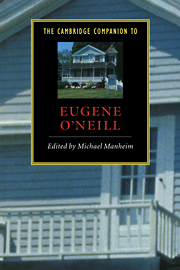Book contents
- Frontmatter
- Introduction
- 1 Celebrant of loss: Eugene O'Neill 1888-1953
- 2 O'Neill's philosophical and literary paragons
- 3 O'Neill and the theatre of his time
- 4 From trial to triumph: the early plays
- 5 The middle plays
- 6 The late plays
- 7 Notable American stage productions
- 8 O'Neill on screen
- 9 O'Neill's America: the strange interlude between the wars
- 10 O'Neill's African and Irish-Americans: stereotypes or “faithful realism”?
- 11 O'Neill's female characters
- 12 "A tale of possessors self-dispossessed"
- 13 Trying to write the family play: autobiography and the dramatic imagination
- 14 The stature of Long Day's Journey Into Night
- 15 O'Neill and the cult of sincerity
- 16 O'Neill criticism
- Select bibliography of full-length works
- Index
5 - The middle plays
Published online by Cambridge University Press: 28 May 2006
- Frontmatter
- Introduction
- 1 Celebrant of loss: Eugene O'Neill 1888-1953
- 2 O'Neill's philosophical and literary paragons
- 3 O'Neill and the theatre of his time
- 4 From trial to triumph: the early plays
- 5 The middle plays
- 6 The late plays
- 7 Notable American stage productions
- 8 O'Neill on screen
- 9 O'Neill's America: the strange interlude between the wars
- 10 O'Neill's African and Irish-Americans: stereotypes or “faithful realism”?
- 11 O'Neill's female characters
- 12 "A tale of possessors self-dispossessed"
- 13 Trying to write the family play: autobiography and the dramatic imagination
- 14 The stature of Long Day's Journey Into Night
- 15 O'Neill and the cult of sincerity
- 16 O'Neill criticism
- Select bibliography of full-length works
- Index
Summary
By the time Desire Under the Elms closed in the fall of 1925, Eugene O'Neill was firmly established as the leading artistic playwright of the American theatre. The “Triumvirate” of O'Neill, Kenneth Macgowan and Robert Edmond Jones had successfully reorganized the Provincetown Players into The Experimental Theatre, an off-Broadway company ready to stage virtually anything which O'Neill could conceive. Guided by the tenets of the Art Theatre movement which Macgowan promoted, O'Neill indulged his imagination, composing the historical extravaganzas “Marco Millions” and Lazarus Laughed and the allegorical The Great God Brown, and sketching out two studies of modern bourgeois America, Strange Interlude and Dynamo, as well. But Marco, Interlude and Dynamo were not produced by the Triumvirate but the Theatre Guild, a prestigious Broadway company whose embrace of O'Neill signalled his arrival as a popular dramatist.
- Type
- Chapter
- Information
- The Cambridge Companion to Eugene O'Neill , pp. 69 - 81Publisher: Cambridge University PressPrint publication year: 1998
- 2
- Cited by

